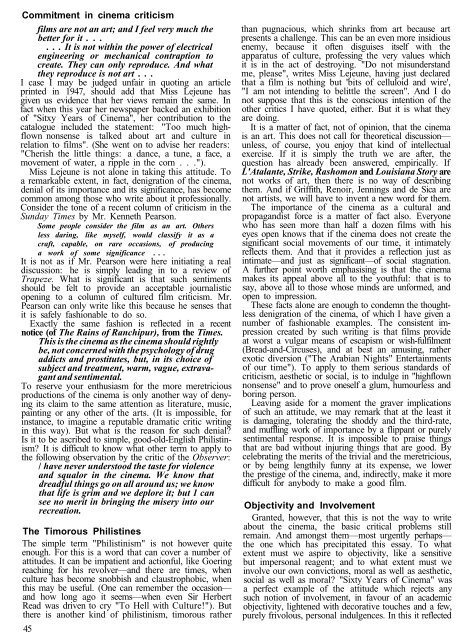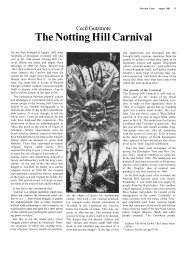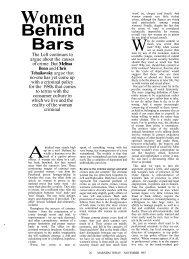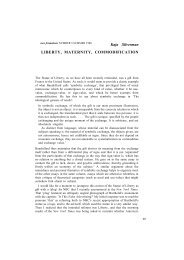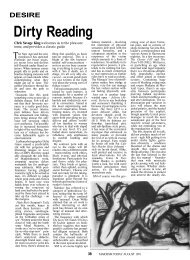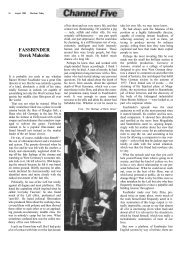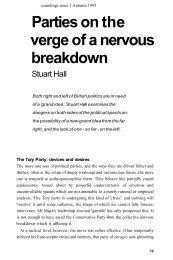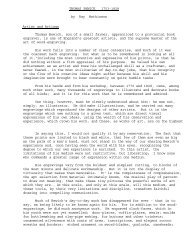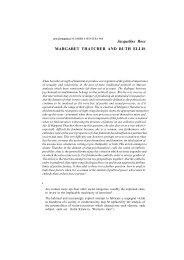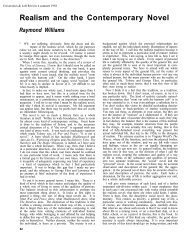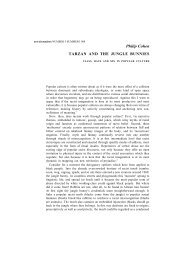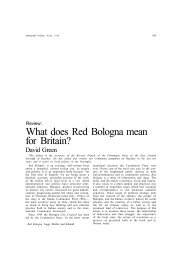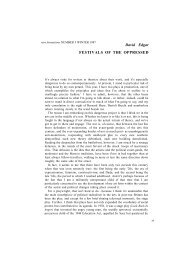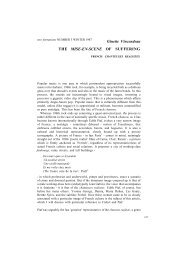Commitment in cinema criticism - amiel and melburn trust
Commitment in cinema criticism - amiel and melburn trust
Commitment in cinema criticism - amiel and melburn trust
Create successful ePaper yourself
Turn your PDF publications into a flip-book with our unique Google optimized e-Paper software.
<strong>Commitment</strong> <strong>in</strong> c<strong>in</strong>ema <strong>criticism</strong><br />
films are not an art; <strong>and</strong> I feel very much the<br />
better for it . . .<br />
. . . It is not with<strong>in</strong> the power of electrical<br />
eng<strong>in</strong>eer<strong>in</strong>g or mechanical contraption to<br />
create. They can only reproduce. And what<br />
they reproduce is not art . . .<br />
I case I may be judged unfair <strong>in</strong> quot<strong>in</strong>g an article<br />
pr<strong>in</strong>ted <strong>in</strong> 1947, should add that Miss Lejeune has<br />
given us evidence that her views rema<strong>in</strong> the same. In<br />
fact when this year her newspaper backed an exhibition<br />
of "Sitxy Years of C<strong>in</strong>ema", her contribution to the<br />
catalogue <strong>in</strong>cluded the statement: "Too much highflown<br />
nonsense is talked about art <strong>and</strong> culture <strong>in</strong><br />
relation to films". (She went on to advise her readers:<br />
"Cherish the little th<strong>in</strong>gs: a dance, a tune, a face, a<br />
movement of water, a ripple <strong>in</strong> the corn . . .").<br />
Miss Lejeune is not alone <strong>in</strong> tak<strong>in</strong>g this attitude. To<br />
a remarkable extent, <strong>in</strong> fact, denigration of the c<strong>in</strong>ema,<br />
denial of its importance <strong>and</strong> its significance, has become<br />
common among those who write about it professionally.<br />
Consider the tone of a recent column of <strong>criticism</strong> <strong>in</strong> the<br />
Sunday Times by Mr. Kenneth Pearson.<br />
Some people consider the film as an art. Others<br />
less dar<strong>in</strong>g, like myself, would classify it as a<br />
craft, capable, on rare occasions, of produc<strong>in</strong>g<br />
a work of some significance ...<br />
It is not as if Mr. Pearson were here <strong>in</strong>itiat<strong>in</strong>g a real<br />
discussion: he is simply lead<strong>in</strong>g <strong>in</strong> to a review of<br />
Trapeze. What is significant is that such sentiments<br />
should be felt to provide an acceptable journalistic<br />
open<strong>in</strong>g to a column of cultured film <strong>criticism</strong>. Mr.<br />
Pearson can only write like this because he senses that<br />
it is safely fashionable to do so.<br />
Exactly the same fashion is reflected <strong>in</strong> a recent<br />
notice (of The Ra<strong>in</strong>s of Ranchipur), from the Times.<br />
This is the c<strong>in</strong>ema as the c<strong>in</strong>ema should rightly<br />
be, not concerned with the psychology of drug<br />
addicts <strong>and</strong> prostitutes, but, <strong>in</strong> its choice of<br />
subject <strong>and</strong> treatment, warm, vague, extravagant<br />
<strong>and</strong> sentimental.<br />
To reserve your enthusiasm for the more meretricious<br />
productions of the c<strong>in</strong>ema is only another way of deny<strong>in</strong>g<br />
its claim to the same attention as literature, music,<br />
pa<strong>in</strong>t<strong>in</strong>g or any other of the arts. (It is impossible, for<br />
<strong>in</strong>stance, to imag<strong>in</strong>e a reputable dramatic critic writ<strong>in</strong>g<br />
<strong>in</strong> this way). But what is the reason for such denial?<br />
Is it to be ascribed to simple, good-old-English Philist<strong>in</strong>ism?<br />
It is difficult to know what other term to apply to<br />
the follow<strong>in</strong>g observation by the critic of the Observer:<br />
/ have never understood the taste for violence<br />
<strong>and</strong> squalor <strong>in</strong> the c<strong>in</strong>ema. We know that<br />
dreadful th<strong>in</strong>gs go on all around us; we know<br />
that life is grim <strong>and</strong> we deplore it; but 1 can<br />
see no merit <strong>in</strong> br<strong>in</strong>g<strong>in</strong>g the misery <strong>in</strong>to our<br />
recreation.<br />
The Timorous Philist<strong>in</strong>es<br />
The simple term "Philist<strong>in</strong>ism" is not however quite<br />
enough. For this is a word that can cover a number of<br />
attitudes. It can be impatient <strong>and</strong> actionful, like Goer<strong>in</strong>g<br />
reach<strong>in</strong>g for his revolver—<strong>and</strong> there are times, when<br />
culture has become snobbish <strong>and</strong> claustrophobic, when<br />
this may be useful. (One can remember the occasion—<br />
<strong>and</strong> how long ago it seems—when even Sir Herbert<br />
Read was driven to cry "To Hell with Culture!"). But<br />
there is another k<strong>in</strong>d of philist<strong>in</strong>ism, timorous rather<br />
45<br />
than pugnacious, which shr<strong>in</strong>ks from art because art<br />
presents a challenge. This can be an even more <strong>in</strong>sidious<br />
enemy, because it often disguises itself with the<br />
apparatus of culture, profess<strong>in</strong>g the very values which<br />
it is <strong>in</strong> the act of destroy<strong>in</strong>g. "Do not misunderst<strong>and</strong><br />
me, please", writes Miss Lejeune, hav<strong>in</strong>g just declared<br />
that a film is noth<strong>in</strong>g but 'bits of celluloid <strong>and</strong> wire',<br />
"I am not <strong>in</strong>tend<strong>in</strong>g to belittle the screen". And I do<br />
not suppose that this is the conscious <strong>in</strong>tention of the<br />
other critics I have quoted, either. But it is what they<br />
are do<strong>in</strong>g.<br />
It is a matter of fact, not of op<strong>in</strong>ion, that the c<strong>in</strong>ema<br />
is an art. This does not call for theoretical discussion—<br />
unless, of course, you enjoy that k<strong>in</strong>d of <strong>in</strong>tellectual<br />
exercise. If it is simply the truth we are after, the<br />
question has already been answered, empirically. If<br />
L'Atalante, Strike, Rashomon <strong>and</strong> Louisiana Story are<br />
not works of art, then there is no way of describ<strong>in</strong>g<br />
them. And if Griffith, Renoir, Jenn<strong>in</strong>gs <strong>and</strong> de Sica are<br />
not artists, we will have to <strong>in</strong>vent a new word for them.<br />
The importance of the c<strong>in</strong>ema as a cultural <strong>and</strong><br />
propag<strong>and</strong>ist force is a matter of fact also. Everyone<br />
who has seen more than half a dozen films with his<br />
eyes open knows that if the c<strong>in</strong>ema does not create the<br />
significant social movements of our time, it <strong>in</strong>timately<br />
reflects them. And that it provides a reflection just as<br />
<strong>in</strong>timate—<strong>and</strong> just as significant—of social stagnation.<br />
A further po<strong>in</strong>t worth emphasis<strong>in</strong>g is that the c<strong>in</strong>ema<br />
makes its appeal above all to the youthful: that is to<br />
say, above all to those whose m<strong>in</strong>ds are unformed, <strong>and</strong><br />
open to impression.<br />
These facts alone are enough to condemn the thoughtless<br />
denigration of the c<strong>in</strong>ema, of which I have given a<br />
number of fashionable examples. The consistent impression<br />
created by such writ<strong>in</strong>g is that films provide<br />
at worst a vulgar means of escapism or wish-fulfilment<br />
(Bread-<strong>and</strong>-Circuses), <strong>and</strong> at best an amus<strong>in</strong>g, rather<br />
exotic diversion ("The Arabian Nights" Enterta<strong>in</strong>ments<br />
of our time"). To apply to them serious st<strong>and</strong>ards of<br />
<strong>criticism</strong>, aesthetic or social, is to <strong>in</strong>dulge <strong>in</strong> "highflown<br />
nonsense" <strong>and</strong> to prove oneself a glum, humourless <strong>and</strong><br />
bor<strong>in</strong>g person.<br />
Leav<strong>in</strong>g aside for a moment the graver implications<br />
of such an attitude, we may remark that at the least it<br />
is damag<strong>in</strong>g, tolerat<strong>in</strong>g the shoddy <strong>and</strong> the third-rate,<br />
<strong>and</strong> muffl<strong>in</strong>g work of importance by a flippant or purely<br />
sentimental response. It is impossible to praise th<strong>in</strong>gs<br />
that are bad without <strong>in</strong>jur<strong>in</strong>g th<strong>in</strong>gs that are good. By<br />
celebrat<strong>in</strong>g the merits of the trivial <strong>and</strong> the meretricious,<br />
or by be<strong>in</strong>g lengthily funny at its expense, we lower<br />
the prestige of the c<strong>in</strong>ema, <strong>and</strong>, <strong>in</strong>directly, make it more<br />
difficult for anybody to make a good film.<br />
Objectivity <strong>and</strong> Involvement<br />
Granted, however, that this is not the way to write<br />
about the c<strong>in</strong>ema, the basic critical problems still<br />
rema<strong>in</strong>. And amongst them—most urgently perhaps—<br />
the one which has precipitated this essay. To what<br />
extent must we aspire to objectivity, like a sensitive<br />
but impersonal reagent; <strong>and</strong> to what extent must we<br />
<strong>in</strong>volve our own convictions, moral as well as aesthetic,<br />
social as well as moral? "Sixty Years of C<strong>in</strong>ema" was<br />
a perfect example of the attitude which rejects any<br />
such notion of <strong>in</strong>volvement, <strong>in</strong> favour of an academic<br />
objectivity, lightened with decorative touches <strong>and</strong> a few,<br />
purely frivolous, personal <strong>in</strong>dulgences. In this it reflected


